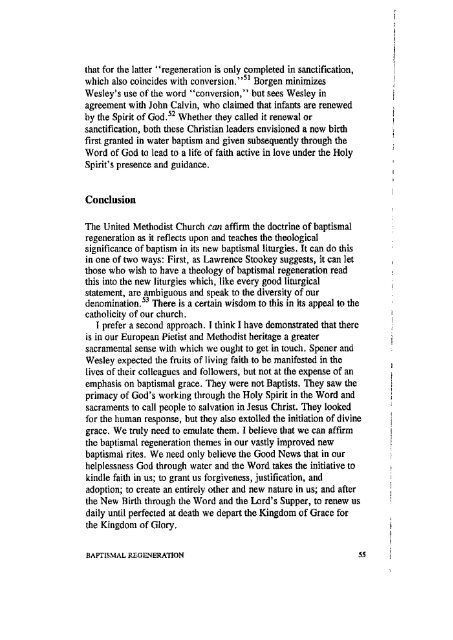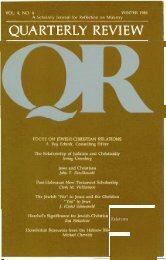TJieodore W. Jennings, Jr. The Meaning of ... - Quarterly Review
TJieodore W. Jennings, Jr. The Meaning of ... - Quarterly Review
TJieodore W. Jennings, Jr. The Meaning of ... - Quarterly Review
Create successful ePaper yourself
Turn your PDF publications into a flip-book with our unique Google optimized e-Paper software.
that for the latter "regeneration is only completed in sanctification,<br />
which also coincides with conversion." 51<br />
Borgen minimizes<br />
Wesley's use <strong>of</strong> the word "conversion," but sees Wesley in<br />
agreement with John Calvin, who claimed that infants are renewed<br />
by the Spirit <strong>of</strong> God. 52<br />
Whether they called it renewal or<br />
sanctification, both these Christian leaders envisioned a new birth<br />
first granted in water baptism and given subsequendy through the<br />
Word <strong>of</strong> God to lead to a life <strong>of</strong> faith active in love under the Holy<br />
Spirit's presence and guidance.<br />
Conclusion<br />
<strong>The</strong> United Methodist Church can affirm the doctrine <strong>of</strong> baptismal<br />
regeneration as it reflects upon and teaches the theological<br />
significance <strong>of</strong> baptism in its new baptismal liturgies. It can do this<br />
in one <strong>of</strong> two ways: First, as Lawrence Stookey suggests, it can let<br />
those who wish to have a theology <strong>of</strong> baptismal regeneration read<br />
this into the new liturgies which, like every good liturgical<br />
statement, are ambiguous and speak to the diversity <strong>of</strong> our<br />
denomination. 53<br />
<strong>The</strong>re is a certain wisdom to this in its appeal to the<br />
catholicity <strong>of</strong> our church.<br />
I prefer a second approach. I think I have demonstrated that there<br />
is in our European Pietist and Methodist heritage a greater<br />
sacramental sense with which we ought to get in touch. Spener and<br />
Wesley expected the fruits <strong>of</strong> living faith to be manifested in the<br />
lives <strong>of</strong> their colleagues and followers, but not at the expense <strong>of</strong> an<br />
emphasis on baptismal grace. <strong>The</strong>y were not Baptists. <strong>The</strong>y saw the<br />
primacy <strong>of</strong> God's working through the Holy Spirit in the Word and<br />
sacraments to call people to salvation in Jesus Christ. <strong>The</strong>y looked<br />
for the human response, but they also extolled the initiation <strong>of</strong> divine<br />
grace. We truly need to emulate them. I believe that we can affirm<br />
the baptismal regeneration themes in our vastly improved new<br />
baptismal rites. We need only believe the Good News that in our<br />
helplessness God through water and the Word takes the initiative to<br />
kindle faith in us; to grant us forgiveness, justification, and<br />
adoption; to create an entirely other and new nature in us; and after<br />
the New Birth through the Word and the Lord's Supper, to renew us<br />
daily until perfected at death we depart the Kingdom <strong>of</strong> Grace for<br />
the Kingdom <strong>of</strong> Glory.<br />
BAPTISMAL REGENERATION<br />
55












